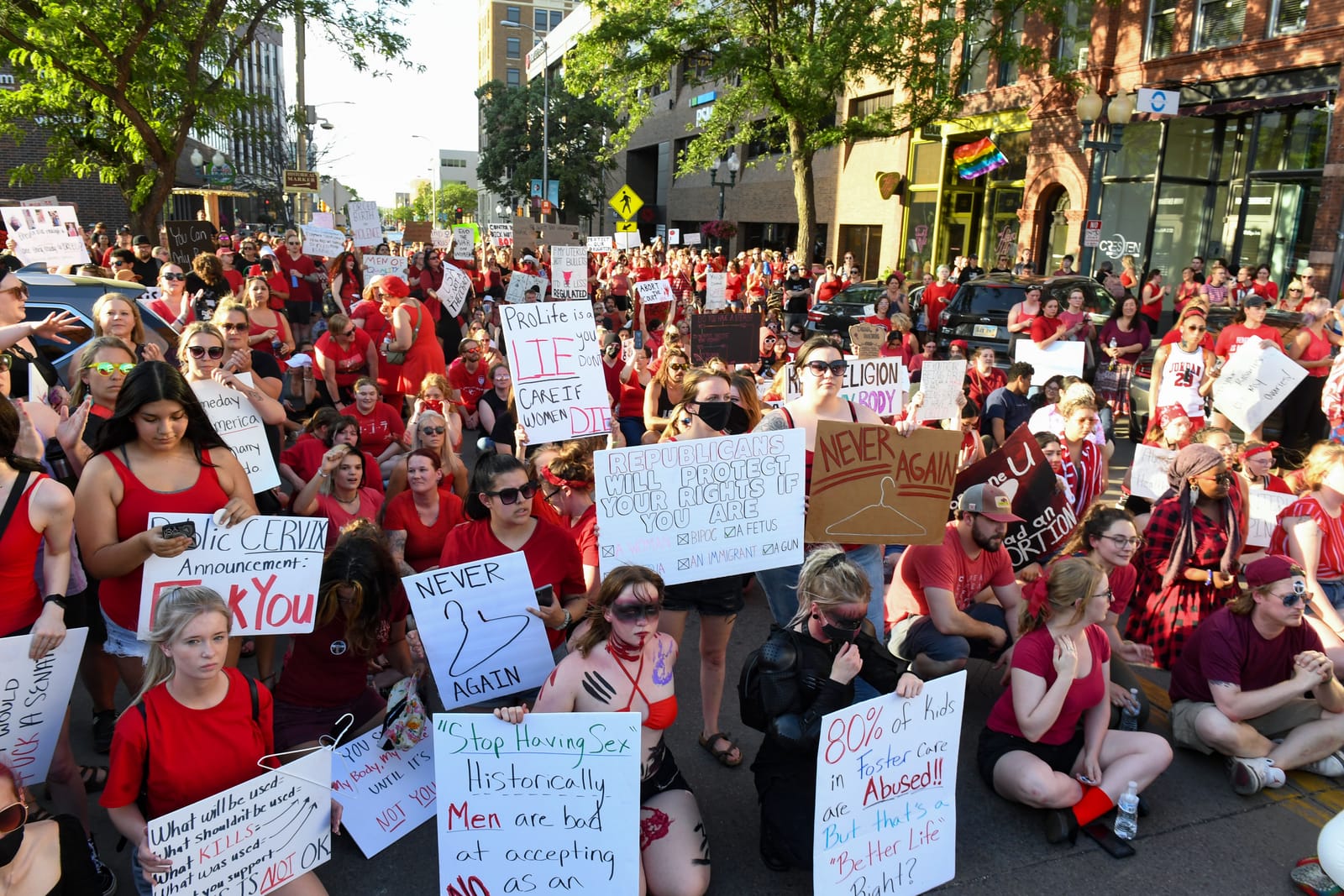The deadline for printing ballots for the November 2024 election presents a daunting timetable for an anti-abortion group seeking to keep an abortion rights amendment from being decided at the polls.
But Life Defense Fund said as part of its lawsuit that even if Amendment G makes the Nov. 5 ballot, the South Dakota Secretary of State's office could make a public announcement that "no votes for or against the measure will be counted or have any impact."
That's part of an amended complaint filed in state circuit court in Minnehaha County after the South Dakota Supreme Court on Aug. 2 reversed the lower court's dismissal of the lawsuit. Life Defense Fund contends that Amendment G's sponsor, Dakotans for Health, violated state laws with improper petition circulation.
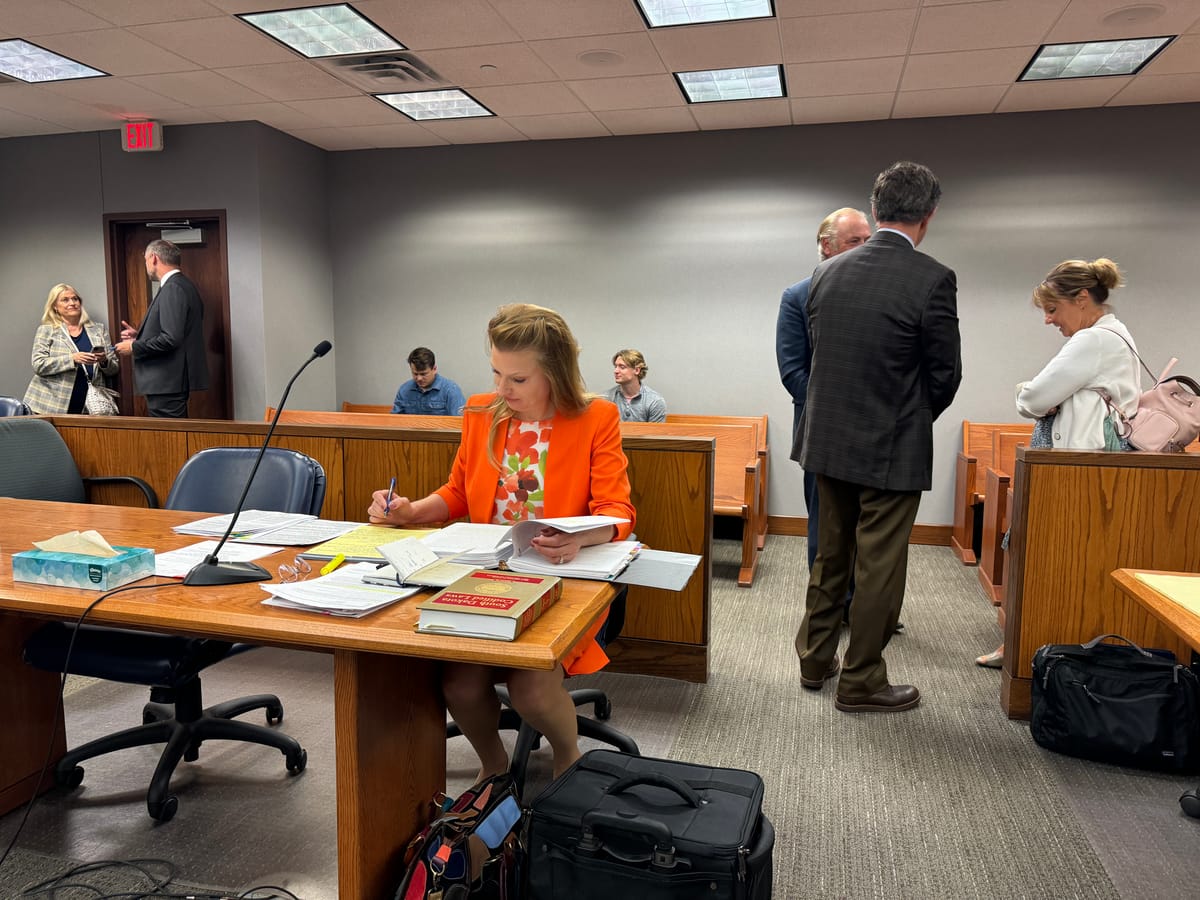
At the same time, the Supreme Court denied Life Defense Fund's request to expedite the matter in circuit court. That makes it highly unlikely that it will be resolved by Aug. 13, the deadline for the secretary of state to certify copies of all ballot questions to county auditors for ballots to be printed.
The suggestion that Amendment G appear on the ballot but voters be instructed to disregard it would be an extremely rare occurrence in the state, if not unprecedented, said Michael Card, emeritus professor of political science at the University of South Dakota.
He noted that there have been scenarios in other states where candidates died after ballots were printed, but the votes still counted and some of those candidates even ended up winning.
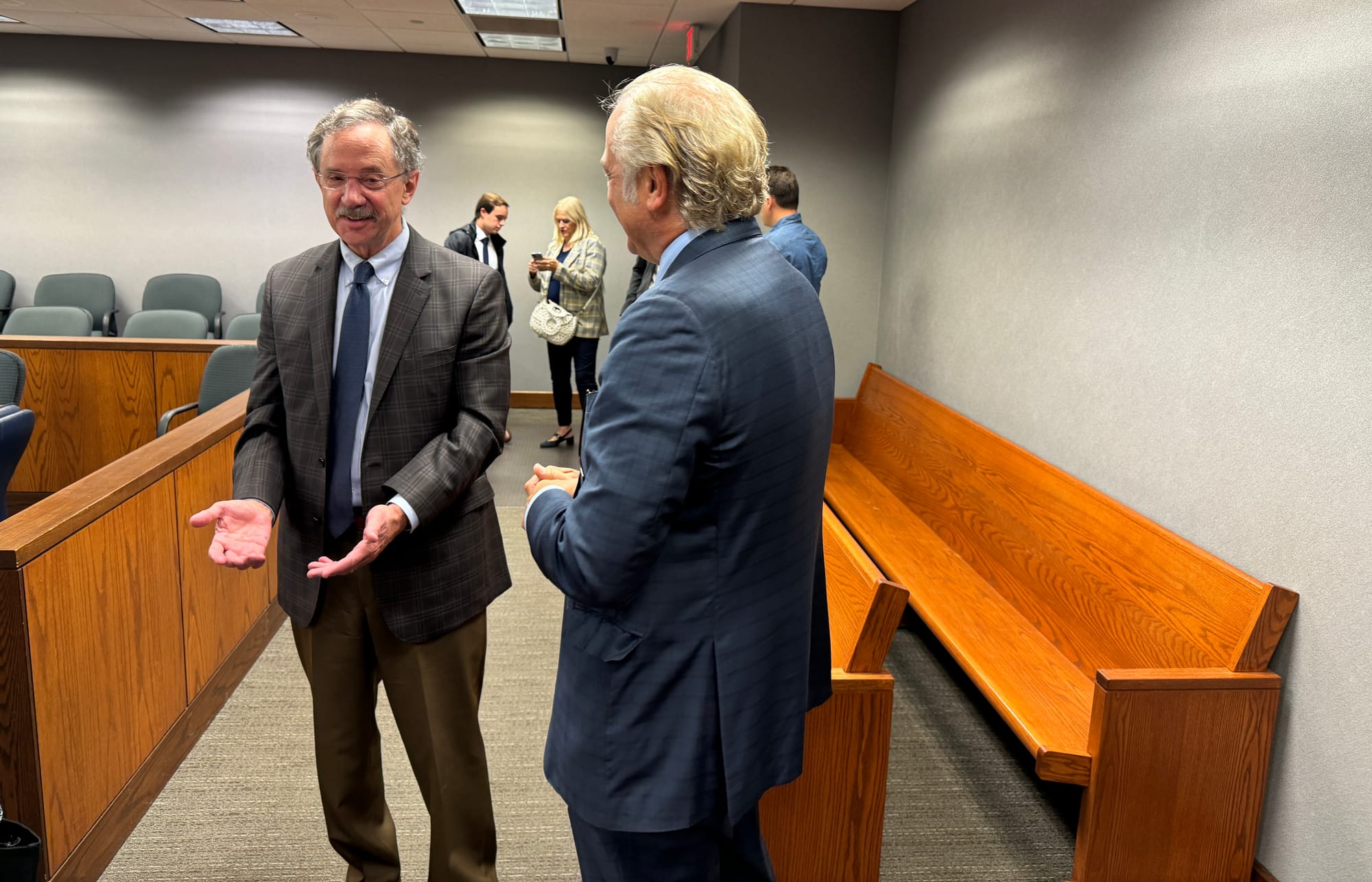
Sara Frankenstein, the Rapid City lawyer representing Life Defense Fund, told News Watch that the anti-abortion group is trying to meet the Aug. 13 deadline but has looked at other options if that's not possible.
"It’s not unprecedented for measures to be disqualified after they are printed on the ballot," said Frankenstein. "For instance, the South Dakota marijuana measure, Amendment A, was voted on and passed (in 2020), yet the court still disqualified it."
Gov. Kristi Noem’s administration challenged that recreational marijuana effort, saying it violated the state’s requirement that constitutional amendments deal with just one subject. That argument prevailed in a 4-1 decision at the South Dakota Supreme Court.
That's different from a court telling the secretary of state to proclaim that a constitutional amendment on the ballot will not be counted, said Rick Weiland, co-founder of Dakotans for Health, a grassroots organization that pushes for progressive policy through petition efforts.
"There's no provision in South Dakota law that allows that," Weiland told News Watch. "They've been saying all along that this (Aug. 13) deadline is a hard stop, and now they're saying, 'Well, don't accept anything we said about that. The court can just dictate to the secretary of state not to count the votes.' It just looks like another in a series of desperate measures from them."
Secretary of State Monae Johnson and Deputy Secretary of State Tom Deadrick declined to comment on the legal and logistical challenges involved in the scenario proposed by Life Defense Fund.
Abortion case heads back to circuit court
The Supreme Court reversal gives Life Defense Fund another chance to plead its case in front of Circuit Court Judge John Pekas, this time with specific allegations of petition misconduct on the table. The group had sought to remove Pekas from the proceedings, but the Supreme Court decision rejected that argument.
On July 15, Pekas ruled in favor of Dakotans for Health by granting a motion to dismiss the lawsuit. Rather than examine itemized charges in the complaint, the judge noted the importance of following election law and questioned why the secretary of state's office wasn’t named as a party in the lawsuit.
The amended complaint from Life Defense Fund now lists Secretary of State Johnson as a defendant, a nod to Dakotans for Health's argument that the state's top elections official is an indispensable party in the proceeding. That indicates a party whose presence and participation in court are required in order for the lawsuit to proceed.

Frankenstein told News Watch that the group's complaint is not focused on Johnson's certification of Amendment G but rather on the actions of Dakotans for Health organizers and petitioners in gathering signatures to make the ballot.
Life Defense Fund, led by Republican state legislator Jon Hansen and longtime anti-abortion advocate Leslee Unruh, seeks a ruling that the amendment is "disqualified, invalid, and/or has not been validly submitted pursuant to South Dakota law."
Hansen is also vice president of South Dakota Right to Life, a powerful anti-abortion lobbying force in the state.
Life Defense Fund also seeks an expedited scheduling order and for Dakotans for Health organizers and petition circulators to be banned from "performing any work for any ballot question committee for a period of four years."
Unruh referred to Weiland's group, which uses paid petition circulators, in a statement last week as a "paid posse" that has "broken laws, tricked South Dakotans into signing their abortion petition, left petitions unattended, and much more."
Weiland responded that "to try to ban any entity from working with citizens of the state to address concerns that they have about their government is really beyond the pale."
Abortion rights amendment set for Nov. 5 ballot
South Dakota is currently under a 2005 state trigger law activated in June 2022 when the Supreme Court overturned Roe v. Wade and left it up to states to determine their stance on abortion rights.
South Dakota's law makes it a Class 6 felony for anyone “who administers to any pregnant female or prescribes or procures for any pregnant female” a means for an abortion, except to save the life of the mother.
If passed, Amendment G would prevent the state from regulating abortions during the first trimester, following a similar framework as Roe. During the second trimester, the state could regulate the abortion decision, but any regulation must be reasonably related to the physical health of the mother. During the third trimester, abortion could be prohibited except if it is necessary to preserve the life or health of the pregnant woman, according to her physician.
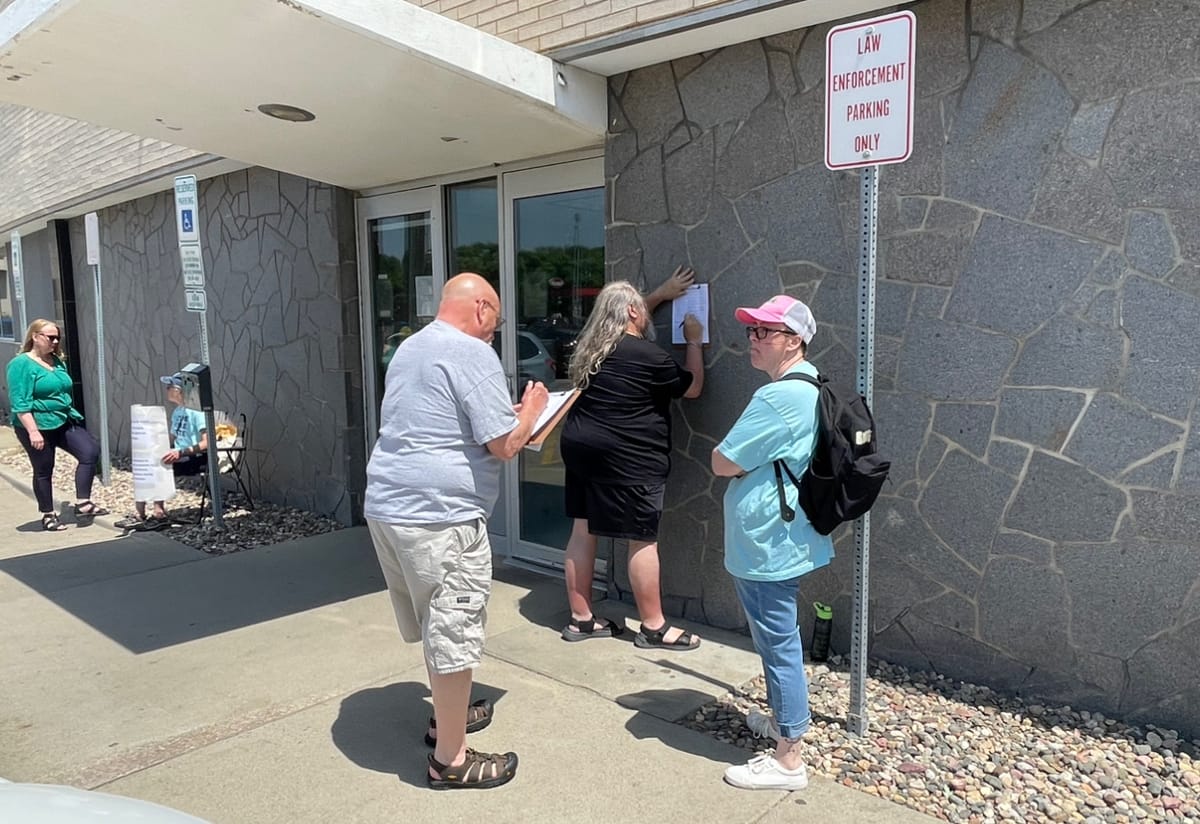
On May 16, the secretary of state’s office certified the measure for the Nov. 5 ballot, saying that a random sample showed 46,098 of the 54,281 submitted signatures were deemed valid, well over the threshold of 35,017.
Nearly a month later, Life Defense Fund filed a complaint in state circuit court asking that the amendment be disqualified.
A statewide poll co-sponsored by News Watch and the Chiesman Center for Democracy at the University of South Dakota conducted in May showed that 53% of respondents support Constitutional Amendment G, compared to 35% opposed and 11% undecided.
Federal judge declined to intervene
One of the lawsuit's claims is that Dakotans for Health petition circulators violated a residency affidavit requirement introduced into state law in 2018, sponsored by former Republican state Rep. Mark Mickelson.
Coined the “Mickelson Law” by Life Defense Fund, it created a state registry of petition circulators and required them to submit personal information and wear ID badges. It included a provision that an affidavit be filed with the secretary of state’s office with information attesting to residency of each circulator.
That law was later superseded by Senate Bill 180, which was halted in federal court in January 2023 as part of a permanent injunction signed by U.S. District Judge Lawrence Piersol, an action upheld by the U.S. Court of Appeals.

Life Defense Fund argues that because “no bill amending the Mickelson Law is currently in force, the Mickelson Law stands in its original form, unamended. The Mickelson Law is the current law in effect in South Dakota.”
Dakotans for Health filed a motion in federal court to enforce the permanent injunction and halt Life Defense Fund's lawsuit. But U.S. District Judge Karen Schreier on July 5 ruled that state court proceedings should be allowed to continue before determining if federal intervention was warranted.
In its federal filing, Dakotans for Health included a document showing lawyers for the state acknowledging in writing to the plaintiffs on Jan. 24, 2023: “The permanent injunction includes the 30-day residency requirement challenged in your lawsuit.”
'People should be able to vote'
The lawsuit also outlines allegations of signature-gathering misconduct, recasting points of controversy that emerged during the petition campaign and 2024 legislative session.
Among those accusations are that circulators left petitions unattended, failed to provide a circulator handout as required by law, and purposely confused the public with a “bait and switch” involving the grocery tax and abortion measures.
Attorney General Marty Jackley sent a letter to Dakotans for Health on Oct. 31, 2023, that mentioned "video and photographic evidence" of such encounters and warned of potentially illegal actions taken by petition circulators. No charges were filed.
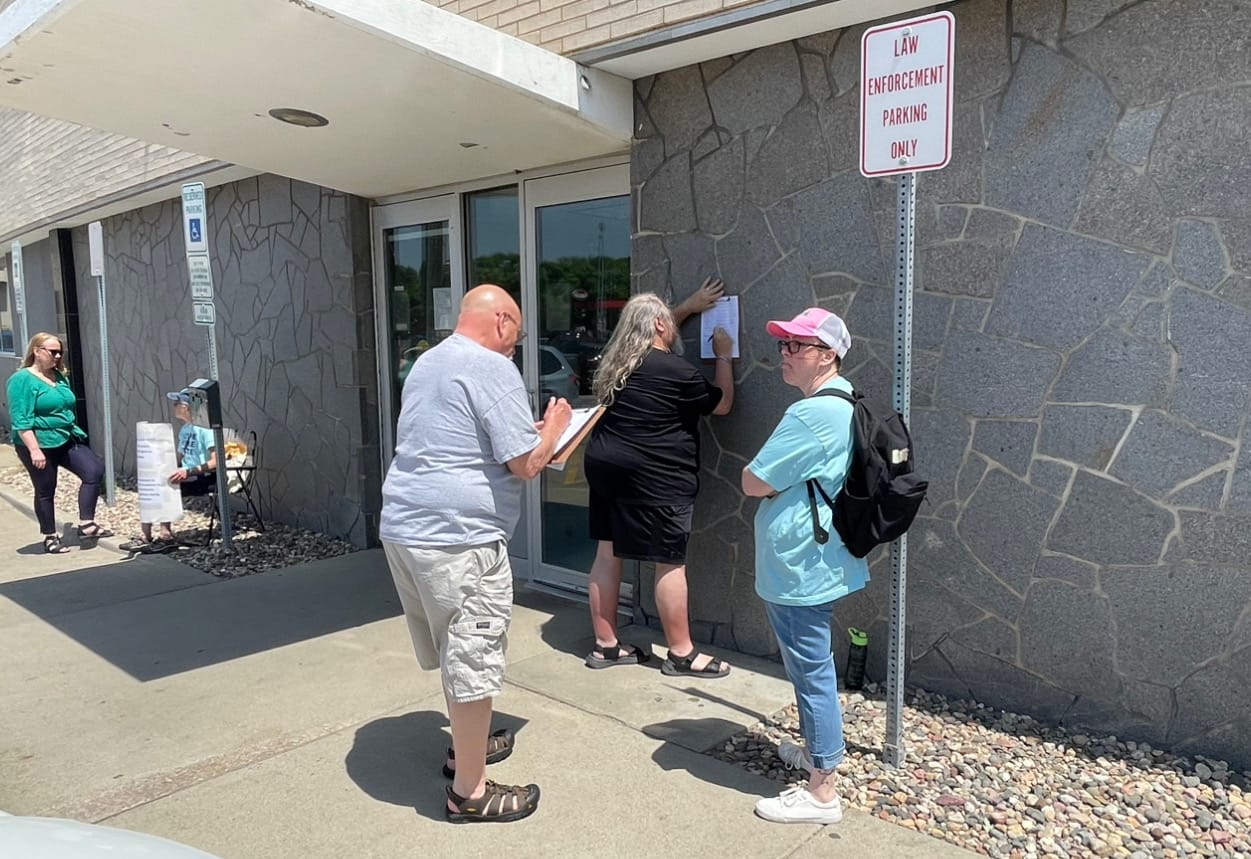
Leach called the allegations “deceptive and overblown” in a February interview with News Watch. During a later interview, he stressed that it was important to let the people have their say at the ballot box as part of South Dakota’s longstanding initiative process.
“People want to vote," he said. "People signed petitions to vote. (Life Defense Fund) is saying that people shouldn’t be able to vote. Well, this is America. People should be able to vote.”
Pekas dismissed Life Defense Fund's complaint at a July 15 hearing at the Minnehaha County Courthouse, saying from the bench that "I don't know how Dakotans for Health can control the secretary of state. They submitted the (petition) information to the state of South Dakota and it has been accepted."
In appealing to the state Supreme Court two days later, Frankenstein called that a misinterpretation of state law, which states that a summons and complaint “shall be served on each petition sponsor as a party defending the validated petition being challenged.”
Supreme Court nixes fast-track request
The appeal stated that “the circuit court failed to apply the statute requiring Life Defense Fund to file a summons and complaint against Dakotans for Health. The court should move swiftly to reverse and remand the case to permit discovery to commence and the case to proceed forward over the next four weeks.”
The Supreme Court ruling on Friday stressed that "the Court has not decided and expresses no opinion on any issues raised by the parties, including whether the Secretary of State is an indispensable party to this action. Any such issues can be resolved ... by the circuit court on remand."
The high court also rejected the expedited timeline, noting that "this exceptional level of supervision over a circuit court's calendar is not supported by the current state of the record."
Weiland told News Watch that he views Life Defense Fund's legal gambit as another in a series of attempts to block the measure from reaching voters, from "Decline to Sign" protests to challenging the measure's language to Hansen spearheading a state law allowing residents to revoke petition signatures.
“I’ve thought all along that this was a bridge too far for them to think they could dismiss 55,000 South Dakotans based on some petitioner residency requirement that’s not on the books,” Weiland said. “Every time they’ve tried to disrupt this and make it about something other than letting the people vote, they’ve been unsuccessful.”
Unruh countered that her group is "thrilled" that the matter has been sent back to state court, "where our case can be heard and thoroughly examined."
The next hearing in Pekas' courtroom has not yet been scheduled.
This story was produced by South Dakota News Watch, an independent, nonprofit news organization. Read more in-depth stories at sdnewswatch.org and sign up for an email every few days to get stories as soon as they're published. Contact investigative reporter Stu Whitney at stu.whitney@sdnewswatch.org.

